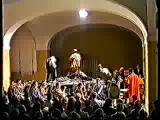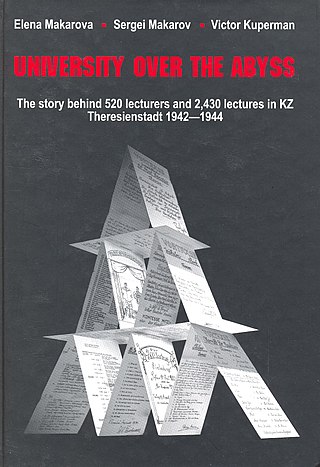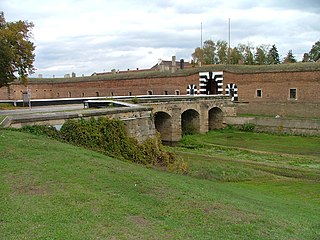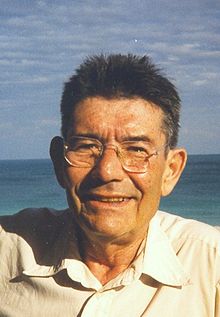
Terezín is a town in Litoměřice District in the Ústí nad Labem Region of the Czech Republic. It has about 2,900 inhabitants. It is a former military fortress composed of the citadel and adjacent walled garrison town. The town centre is well preserved and is protected by law as an urban monument reservation. Terezin is most infamously the location of the Nazis' notorious Theresienstadt Ghetto.

Brundibár is a children's opera by Jewish Czech composer Hans Krása with a libretto by Adolf Hoffmeister, made most famous by performances by the children of Theresienstadt concentration camp (Terezín) in occupied Czechoslovakia. The name comes from a Czech colloquialism for a bumblebee.

Kurt Gerron was a German Jewish actor and film director. He and his wife, Olga, were murdered in the Holocaust.

Vedem was a Czech-language literary magazine that existed from 1942 to 1944 in the Theresienstadt Ghetto in the town of Terezín, during the Holocaust. It was hand-produced by a group of boys, among them editor-in-chief Petr Ginz and Hanuš Hachenburg. Altogether, some 800 pages of Vedem survived World War II.

Theresienstadt Ghetto was established by the SS during World War II in the fortress town of Terezín, in the Protectorate of Bohemia and Moravia. Theresienstadt served as a waystation to the extermination camps. Its conditions were deliberately engineered to hasten the death of its prisoners, and the ghetto also served a propaganda role. Unlike other ghettos, the exploitation of forced labor was not economically significant.

Viktor Ullmann was a Silesia-born Austrian composer, conductor and pianist.

Karel Berman was a Jewish Czech opera singer, composer, opera director, and translator.

Rafael Schächter, was a Czechoslovak composer, pianist and conductor of Jewish origin, organizer of cultural life in Terezín concentration camp.

Miroslav Kárný was a historian and writer from Prague, Czechoslovakia.

Wilhelm Jerusalem was an Austrian Jewish philosopher and pedagogue.

Der Kaiser von Atlantis oder Die Tod-Verweigerung is a one-act opera by Viktor Ullmann with a libretto by Peter Kien. They collaborated on the work while interned in the Nazi concentration camp of Theresienstadt (Terezín) around 1943. The Nazis did not allow it to be performed there.
Daniel Mandl was a civil engineer, inventor, and a student of anthroposophy.

University over the Abyss is a book about the educational and cultural life in the Terezín ghetto. Authors Elena Makarova, Sergei Makarov and Viktor Kuperman have searched available archives, interviewed survivors worldwide and compiled the definitive summary of this nominally illegal but extensive phenomenon that included formal lectures, poetry readings, concerts, storytelling sessions and theatrical and opera performances, all in a setting that was a holding place for prisoners who were ultimately on their way to the Auschwitz-Birkenau extermination camp.

Herbert Gantschacher is an Austrian director and producer and writer.
ARBOS – Company for Music and Theatre in Vienna, Salzburg and Klagenfurt, is a society specialized in the realisation of new forms of theatre especially of projects for contemporary new music theatre, scenic concerts, theatre for young people, theatre concerts, deaf theatre, directed space, theatrical exhibitions and other forms of the arts.
Spuren nach Theresienstadt / Tracks to Terezín is a film with Herbert Thomas Mandl, a survivor of the Holocaust.
Dževad Karahasan was a Bosnian writer, essayist and philosopher. Karahasan was awarded the Herder Prize and Goethe Medal for his writings.
Josef (Pepek) Taussig was a Czech journalist.

The Small Fortress is a fortress forming a significant part of the town of Terezín in the Czech Republic. The former military fortress was established at the end of the 18th century together with the whole town of Terezín on the right bank of the Ohře River. It served as a prison in the 19th century and was also house of Imprisonment for Gavrilo Princip.
Anna Hájková is a Czech-British historian who is currently a faculty member at the University of Warwick. She specializes in the study of everyday life during the Holocaust and sexuality and the Holocaust. According to Hájková, "My approach to queer Holocaust history shows a more complex, more human, and more real society beyond monsters and saints."
















